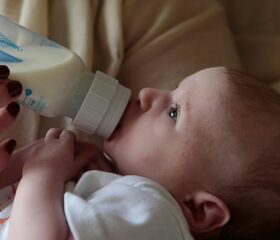When Is It Safe for Your Baby to Drink Cow’s Milk?
Before making the switch from breast milk or formula to cow’s milk, you’ll need to make sure the timing is right for your baby.

Adding a little cow’s milk to your baby’s cereal may seem harmless enough, but introducing it too early or in the wrong way may do more harm than good. 1
Here’s everything you need to know about when and how to start offering milk, what type to choose, and how to handle any bumps along the way.
When is it safe to introduce cow's milk?
The American Academy of Pediatrics (AAP) and the Centers for Disease Control and Prevention (CDC) recommend that you wait until your baby’s first birthday to introduce her to cow’s milk. 1 2
Even if she’s eating solid food, breast milk or formula should remain her main source of nutrition for her first year. She doesn’t need other types of milk to get everything she needs.
Why you shouldn’t introduce cow’s milk earlier than 12 months old
Before she’s 12 months old, your baby’s digestive system and kidneys just aren’t mature enough to handle the high concentrations of protein and minerals in cow’s milk. Feeding it to her may result in:
- Kidney stress: The protein and minerals in milk may be too much for your baby’s immature kidneys to handle. Drinking milk too early can lead to dehydration or kidney strain. 1
- Digestive upset: Offering cow’s milk too early can introduce a risk of intestinal bleeding and lead to iron-deficiency anemia. 1
- Nutritional gaps: Formula and breast milk are specifically designed to meet all your baby’s nutritional needs during her first year of life. Cow’s milk can’t compare at this age. 3
Note that if your baby was born prematurely, it’s safest to wait until she reaches her corrected age of 12 months before introducing cow’s milk. 4
To work out your baby’s corrected age, subtract the number of weeks she was born prematurely from her actual age (i.e., at 3 months old, a baby that was born 4 weeks early has a corrected age of 2 months old).
Is cow’s milk an appropriate substitute when you don’t have formula?
During a baby formula shortage in May 2022, the AAP updated its advice to state that whole cow’s milk can be a short-term option for babies 6 months and older when formula is unavailable.
While it’s better than homemade formula or diluted formula, it’s not ideal and shouldn’t become routine. Note that if circumstances force you to temporarily rely on cow’s milk, your baby may also need iron supplements. 5
What about cheese and yogurt?
Although you’ll need to wait until your baby is 12 months old to offer her cow’s milk, other dairy products have an earlier timeline. The transition to solid foods usually marks the point when babies can have yogurt and pasteurized cheese.
Many parents begin this transition when their babies are between 4 months and 7 months old. 6 However, it may be best to hold off on dairy until around 6 months, as it can slow down bowel movements and contribute to lower iron absorption.
What are the benefits of cow's milk for toddlers?
Once your toddler hits the one-year mark, cow’s milk becomes a great addition to her diet and will help fuel her growth and development.
It’s full of essential minerals and vitamins like:
- Protein and potassium: These are key players for building muscles and supporting healthy heart function. 7
- Vitamins A, D, and B12: These help keep your baby’s immune system strong, bones healthy, and body cells working properly. (Most milk in the US is fortified with extra vitamin D to aid calcium absorption.) 8
- Calcium: It’s not for nothing that you’ve heard that milk builds strong bones and teeth. Cow’s milk is full of calcium that facilitates your baby’s bone and tooth development. 7
- Healthy fats: Whole milk is packed with fats that aid your baby’s growth and brain development. 7
Moreover, toddlers who start drinking milk early are more likely to keep drinking it as they grow older. This will ensure your child gets all the calcium and vitamin D she needs throughout her childhood. 9
How much milk should toddlers drink?
Getting the amount right is just as important as when you start. Here’s how much milk to give your baby when she’s: 1
- 1 year old: Aim for about 1 to 2 cups of whole milk each day.
- 2 years old: Give your baby about 1 to 2 cups of low-fat or whole milk daily—talk to your doctor for a better idea of her nutritional needs.
Balance is key; think of milk as a complement to a healthy, varied diet, not the main course. Overdoing it can reduce your baby’s appetite for other important solid foods, which could lead to iron deficiencies and a risk of anemia. 9
Moreover, she could be at risk of constipation if she doesn’t get the necessary fiber from whole grains or fruits and vegetables.
How to transition from breast milk or formula to cow’s milk
If you breastfed your baby during her first year (instead of using formula), she may take to cow’s milk more easily. This is because she’ll have already been exposed to tiny amounts of cow’s milk protein through breast milk. 10
Still, many babies need a little time to adjust. Switching from formula or breast milk to cow’s milk is a big shift in flavor and texture.
You’ll have to be patient with your toddler as she gets used to cow’s milk, especially if you’re going through the process of weaning her off breast milk.
To introduce cow’s milk safely to your baby, start by blending cow’s milk with breast milk or formula (a 50/50 mix works well). 11 Gradually increase her cow’s milk portion every few days while decreasing breast milk or formula. Eventually, your toddler will be drinking 100% cow’s milk.
Other tips to help your toddler transition to cow’s milk
Some babies prefer their milk warm, especially if they’re used to warm bottles. Heat it gently and always test the temperature first.
As you transition, also start moving away from bottles to sippy cups or straw cups to help prevent dental issues. If your toddler resists, focus first on switching the milk and then the cup.
Never put your toddler to bed with a bottle or sippy cup of milk, as these could damage her teeth. Moreover, always brush her teeth after her last drink of milk of the day. 12
On a related note, don’t rely too much on sippy cups; it’s better to transition your child to a regular cup as soon as she’s ready.
How to choose the right cow’s milk for your toddler
Generally, experts recommend giving children aged 12–24 months whole milk, as they need the higher fat content for their brain and body development. 1 That said, your pediatrician may recommend switching to 2% if they’re concerned about your child’s weight or growth. 1
Once your baby reaches the age of 2, switch to lighter options like low-fat or skim milk. 1
Buying special “toddler milk” is unnecessary
Toddler milks marketed for ages 12–36 months aren’t worth it. They don’t offer any nutritional advantages over regular milk and a healthy diet. 9 Save your money; cow’s milk (plus solid foods) will do the trick just fine.
Should you pick organic or non-organic milk?
While organic milk contains fewer pesticides and antibiotic residues, the AAP says there’s no proven long-term health difference between organic and conventional milk. 13
No matter what, always choose pasteurized milk. Unpasteurized milk (also called “raw” milk) can carry harmful bacteria like Salmonella or E. coli, and it isn’t safe for kids. 14
You could also opt for ultra-pasteurized milk, which is heated to a higher temperature to give it a longer shelf life. Nutritionally, it’s the same as regular pasteurized milk, just a bit more convenient. 15
What about dairy-free milks?
If your toddler has a milk allergy, lactose intolerance, or follows a vegan diet, there are plenty of milk alternatives on the market today. 16
However, be aware that many of these alternative milks contain high levels of sugar and lack the protein, calcium, and vitamin D found in cow’s milk (unless they’re heavily fortified). 16
Nutritionally speaking, fortified unsweetened soy milk is the best non-dairy substitute for cow’s milk. Still, as with cow’s milk, you’ll need to wait until she’s at least a year old before introducing soy beverages. 2
Also, keep in mind that, until age 2, kids need higher-fat milks, so always go for the fattiest non-dairy option available.
What should you do if your toddler won’t drink milk?
Not every kid is a milk lover, and that’s OK. If your child turns up her nose, try:
- Offering it at different temperatures (some kids prefer it ice-cold, others like it warm)
- Mixing milk into smoothies with fruit
- Pouring milk over cereal or stirring it into oatmeal
If your child still won’t go for it, try serving other foods that are rich in calcium (yogurt, cheese, leafy greens, tofu) and vitamin D (salmon, egg yolks, fortified cereals). She may need supplements if she doesn’t get enough nutrients from her diet alone, so check with your pediatrician. 2
What are the signs of a milk allergy or lactose intolerance in toddlers?
If your baby refuses to drink milk, it might not have anything to do with the taste. Just like adults, babies can also be prone to milk allergies or lactose intolerance. 3
Signs of a milk allergy
A milk allergy involves the immune system reacting to milk proteins. Symptoms can include: 17
- Hives, itching, or skin redness
- Swelling of the face or mouth
- Vomiting or diarrhea
- Coughing, wheezing
- Blood or mucus in the stool
- Anaphylaxis (difficulty breathing, severe swelling)
If your child shows signs of anaphylaxis (like swelling of the mouth or throat, or labored breathing), call 911 immediately.
Make sure you always have two epinephrine auto-injectors on hand if you know your child has a milk allergy. 17
Signs of lactose intolerance
Lactose intolerance is a digestive problem, not an immune reaction. If your baby is lactose intolerant, she may have: 18
- Bloating
- Gas
- Diarrhea
- Cramping
- Nausea
Toddlers may also develop temporary lactose intolerance after a bad bout of diarrhea, though it usually clears up once the gut heals. 16
If you suspect your child has any issues with digesting lactose, talk with your pediatrician or a pediatric allergist to confirm whether your child is really lactose intolerant and figure out the best diet for her going forward.
Final thoughts
Before you pour cow’s milk over your baby’s cereal, remember that it will be too much for her growing body before she’s a year old.
After your baby’s first birthday, you can give her cow’s milk. If you’re worried about milk allergies, unsure of which milk is best for your baby, or want her to follow a plant-based lifestyle, reach out to your pediatrician.
Article Sources
- HealthyChildren.org. "Why Do Infants Need Baby Formula Instead of Cow's Milk?" Retrieved September 24, 2025.
- Centers for Disease Control and Prevention. "Cow's Milk and Milk Alternatives" Retrieved September 24, 2025.
- MedlinePlus. "Cow's milk and children" Retrieved September 24, 2025.
- HealthyChildren.org. "Your Preemie's Growth & Developmental Milestones" Retrieved September 24, 2025.
- Pediatrics in Review. "Pediatric Formulas: An Update" Retrieved September 24, 2025.
- Nemours KidsHealth. "Feeding Your 4- to 7-Month-Old" Retrieved September 24, 2025.
- Nemours KidsHealth. "Nutrition Guide for Toddlers" Retrieved September 24, 2025.
- Centers for Disease Control and Prevention. "Vitamin D" Retrieved September 24, 2025.
- HealthyChildren.org. "Recommended Drinks for Children Age 5 & Younger" Retrieved September 24, 2025.
- Paediatrics & Child Health. "Whole cow’s milk in infancy" Retrieved September 24, 2025.
- Children's Hospital of Philadelphia. "Making the Switch to Cow’s Milk for 1-year-olds" Retrieved September 24, 2025.
- HealthyChildren.org. "Why It’s Important to Take Care of Baby Teeth" Retrieved September 24, 2025.
- Pediatrics. "Organic Foods: Health and Environmental Advantages and Disadvantages" Retrieved September 24, 2025.
- HealthyChildren.org. "Raw Milk: What Parents Need to Know" Retrieved September 24, 2025.
- USDA Food and Nutrition Service. "Nutrition Requirements for Fluid Milk and Substitutions in the CACFP, Questions and Answers" Retrieved September 24, 2025.
- HealthyChildren.org. "Lactose Intolerance in Infants & Children: Parent FAQs" Retrieved September 24, 2025.
- Nemours KidsHealth. "Milk Allergy in Infants" Retrieved September 24, 2025.
- MedlinePlus. "Lactose intolerance" Retrieved September 24, 2025.







